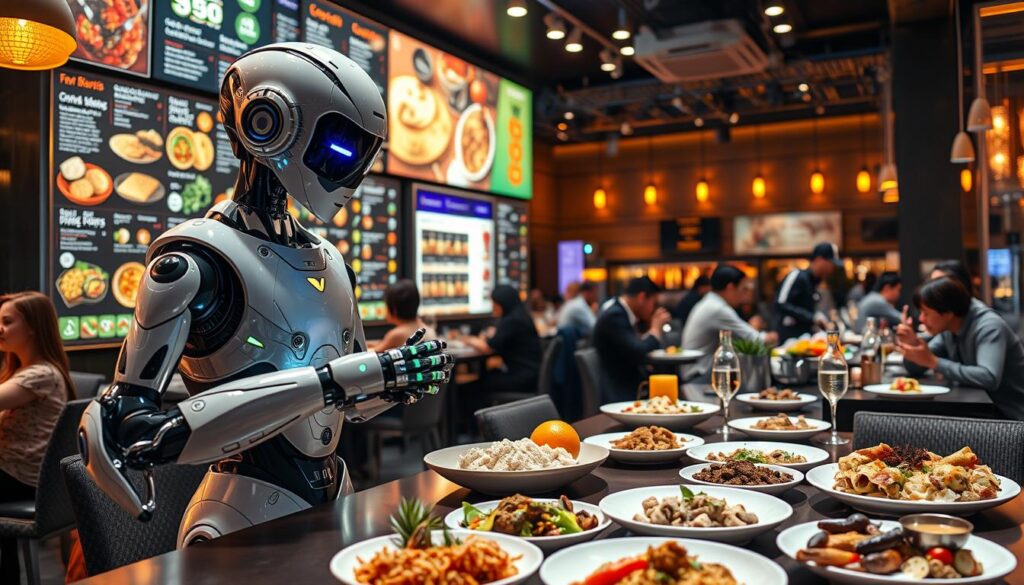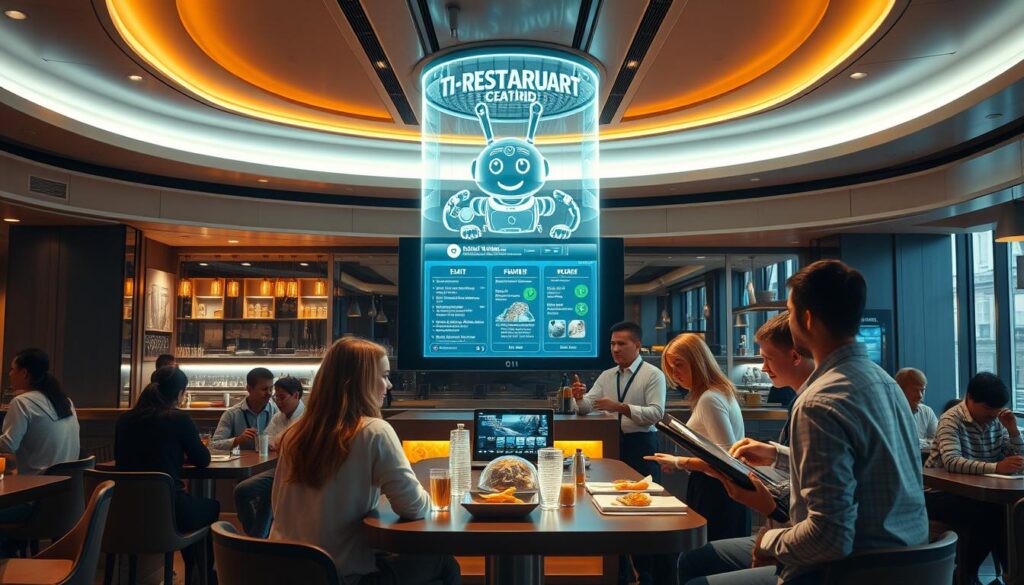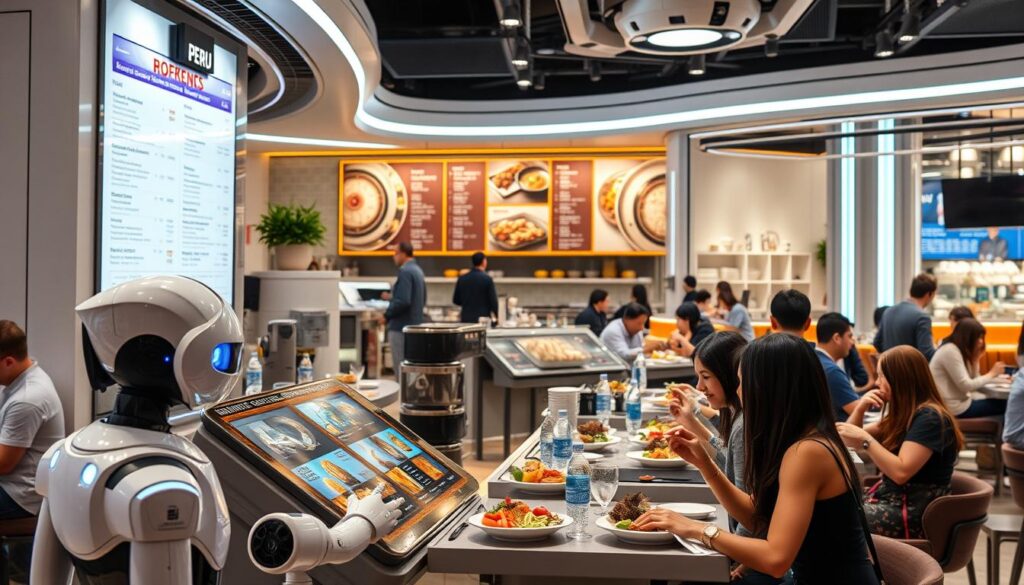In the fast-paced food industry, chatbots are changing the game. They make ordering and managing reservations easier for restaurants and food delivery services. This leads to better customer experiences and smoother operations.
Key Takeaways
- Chatbots are transforming the food industry by automating menu orders, reservations, and customer interactions.
- Chatbots offer seamless ordering and personalization, improving the customer experience.
- Efficient reservation management is another key benefit of chatbots in the food industry.
- Chatbots enhance customer engagement through immediate responses and 24/7 availability.
- Chatbots streamline food service operations, optimizing workflows and reducing administrative tasks.
Revolutionizing Food Service Experiences
The food industry is changing fast, and chatbots are leading this change. These smart virtual helpers are changing how we order food and book tables. They make things easier and better for everyone.
Chatbots help with ordering and managing reservations. They make sure customers get what they want quickly and easily. This makes eating out better for everyone.
Seamless Ordering and Personalization
Food ordering bots have made ordering food simple. Now, customers can look at menus online, pick what they want, and track their orders. This makes ordering smooth and easy.
Thanks to culinary virtual assistants, every order is special. Businesses can now offer a unique experience to each customer. This makes eating out more fun and personal.
Efficient Reservation Management
Chatbots are also changing how we book tables. With food delivery chatbots, booking a table is easy. Customers can change their plans and get updates on their reservations.
This makes booking a table better for everyone. It lets restaurants focus on giving great service. Chatbots take care of the details.
| Feature | Benefit |
|---|---|
| Seamless Ordering | Personalized and frictionless customer experience |
| Reservation Management | Improved efficiency and customer satisfaction |
“Chatbots are transforming the food industry, empowering businesses to deliver exceptional customer experiences and streamline critical operations.”

Chatbots in the Food Industry: A Game-Changer
The food industry has changed a lot with restaurant conversational ai and food service automation. Chatbots have changed the game, making customer experiences better and more efficient. They have become key for businesses to talk to their customers in a new way.
Chatbots are now a big help for restaurants, making things run smoother and talking to customers better. They help with everything from taking orders to making reservations easy. This has made the food industry more efficient and customer-focused.
Streamlining the Ordering Process
Chatbots have made ordering food easy and fun. They use smart tech to understand what customers want and need. This means customers get a better dining experience.
- Effortless order placement: Customers can just talk to the chatbot to order, skipping the old ways of calling or typing.
- Personalized recommendations: Chatbots look at what customers like and suggest food that fits their tastes, making them happier.
- Real-time updates: Customers get updates on their orders right away, cutting down on wait times and making them more satisfied.
Streamlining Reservation Management
Chatbots have also changed how restaurants handle reservations. They make booking a table easy and quick.
- Instant reservation booking: Customers can book, change, or cancel reservations with just a chat.
- Automated table management: Chatbots keep track of tables, seats, and wait times, making dining smooth.
- Personalized reminders: Chatbots send reminders about reservations, helping to reduce no-shows and keep customers coming back.
| Feature | Benefit |
|---|---|
| Seamless Ordering | Easy ordering, personalized food suggestions, updates in real time |
| Efficient Reservation Management | Quick booking, managing tables well, reminders for reservations |
Restaurant conversational ai and food service automation have changed the food industry a lot. They make things run better and give customers a great experience. As these technologies get better, chatbots will keep changing the industry in big ways.

“Chatbots have become an indispensable tool in the food industry, optimizing every aspect of the customer journey and driving business growth.”
Enhancing Customer Engagement
Culinary virtual assistants and food delivery chatbots have changed how we talk to customers in the food industry. These smart systems answer right away and are always there, letting customers reach out at any time. This means customers can connect with the brand day or night.
Immediate Responses, 24/7 Availability
Now, customers can use food delivery chatbots or culinary virtual assistants for questions, feedback, or help with problems. These tech tools give quick and personal answers, helping customers any time they need it.
Customers can ask about menu items, book a table, or solve a problem with these chatbots and virtual assistants. They’re always ready to help. This makes customers happier and more loyal to the brand.
“The ability to get immediate answers and support from our culinary virtual assistant has been a game-changer for our customers. They appreciate the convenience and personalization it provides.”
AI and natural language processing power these food industry tools. They understand what customers need, give accurate info, and even guess what they might want. This makes the customer experience smoother, cutting down on frustration and boosting happiness.
| Feature | Benefit |
|---|---|
| Immediate Responses | Customers can get their questions answered quickly, without having to wait |
| 24/7 Availability | Customers can interact with the brand at any time, ensuring their needs are met |
| Personalized Assistance | Chatbots and virtual assistants can provide tailored support based on customer preferences and history |
| Improved Satisfaction | The seamless customer experience leads to greater satisfaction and loyalty |
Streamlining Operations
Chatbots are changing the game in the food service industry. They make things run smoother and faster. These AI helpers automate many tasks, changing how restaurants and food businesses work.
Chatbots are great at food service automation. They can quickly take orders, manage stock, and help customers. This means workers can spend more time on things that make customers happy.
Restaurant conversational AI makes talking to customers easy and efficient. Chatbots answer questions, solve complex problems, and suggest personalized dishes. This makes the whole process smooth from start to finish.
| Feature | Benefit |
|---|---|
| Automated order processing | Faster and more accurate order fulfillment, reducing errors and improving customer satisfaction. |
| Intelligent inventory management | Optimized stock levels, reduced waste, and improved supply chain efficiency. |
| Streamlined customer service | Prompt and personalized responses, 24/7 availability, and enhanced customer engagement. |
Using food service automation and restaurant conversational AI helps businesses work better. This leads to better performance and competitiveness in the fast-paced food industry.
AI-Powered Culinary Assistants
Chatbots are now AI-powered culinary assistants in the food industry. They are changing how we interact with food and dining. With dietary recommendation systems and recipe chatbots, they help customers make better choices.
Tailored Dietary Recommendations and Recipe Suggestions
These chatbots use smart algorithms to look at what users like, their diet needs, and health goals. They offer meal options and cooking ideas that fit these needs. If you have special diet needs or just want new recipe ideas, these assistants can help. They make eating healthier easier and more fun.
- Personalized dietary recommendations based on user preferences and nutritional needs
- Customized recipe suggestions that cater to individual tastes and dietary restrictions
- Seamless integration of dietary information and recipe ideas for a comprehensive culinary experience
Artificial intelligence is changing how we think about food and planning meals. These assistants give us advice that fits our health and lifestyle goals. Now, we can make choices that are better for us.
“These AI-powered culinary assistants are revolutionizing the way we interact with food, empowering us to make more informed and personalized choices.”
| Feature | Benefit |
|---|---|
| Personalized Dietary Recommendations | Tailored meal options based on individual preferences and nutritional needs |
| Customized Recipe Suggestions | Inspiring cooking ideas that cater to specific dietary restrictions and taste preferences |
| Seamless Integration | Convenient access to comprehensive culinary guidance and information |
The food industry is always changing, and these AI assistants are becoming more important. They give us personalized advice and help us make better choices. This is changing the way we enjoy our meals.
Embracing Omnichannel Experiences
Chatbots are changing the game in the food industry, making customer experiences smooth across all channels. They work from the restaurant’s website to messaging apps, giving customers a unified and personalized experience.
Integrating Chatbots Across Platforms
Hospitality AI solutions and food delivery chatbots are now key in how people order food. Customers can use their favorite apps, websites, or messaging apps like Facebook or WhatsApp. The chatbot makes sure the experience is smooth and consistent everywhere.
- Streamlined Ordering: Customers can easily place orders, customize their preferences, and track their deliveries from their preferred digital spot.
- Personalized Recommendations: Chatbots use customer info to suggest menu items, dietary tips, and more, making meals better.
- Efficient Reservations: Booking tables, changing reservations, and getting updates on availability is easy, thanks to chatbots.
Using this omnichannel strategy, food places can build stronger customer loyalty and work more efficiently. They manage data better and integrate smoothly across platforms.
“Chatbots have become the cornerstone of our omnichannel strategy, enabling us to deliver a consistent and personalized experience to our customers across all touchpoints.”
Data-Driven Insights and Analytics
Chatbots are changing the food service industry in big ways. They make customer experiences better and help streamline operations. They also give businesses important data insights and analytics.
These systems watch how users interact, track order patterns, and collect customer feedback. This helps food service providers make smart decisions. They can improve their offerings and keep up with trends.
Chatbots use automation and restaurant conversational AI to gather lots of data. This data shows what customers like and what they need. By using this info, food places can make their menus better, market smarter, and meet customer needs.
This way, they stay fresh, innovative, and in touch with what customers want.
| Metric | Insights Gained | Potential Impact |
|---|---|---|
| Order Patterns | Identify popular menu items, peak ordering times, and customer dietary preferences | Optimize menu offerings, staff scheduling, and inventory management |
| Customer Feedback | Gather real-time feedback on service quality, dish preferences, and pain points | Enhance customer experience, address issues promptly, and implement targeted improvements |
| Website/App Analytics | Analyze user engagement, navigation patterns, and conversion rates | Improve digital platform design, streamline user journeys, and drive increased online orders |
Using data analytics, food businesses can make smarter choices. This leads to happier customers, better operations, and more profit. Chatbots have changed how businesses make decisions in the food industry.
Overcoming Challenges and Concerns
As chatbots in the food industry grow, we face challenges and concerns. These include data privacy, cybersecurity, and job loss fears. Food service providers must tackle these issues carefully.
Ensuring customer data privacy is a big challenge. Chatbots gather lots of info, like what customers like and how they pay. We must protect this data well to keep customers trusting us. By following strict privacy rules and using strong cybersecurity, we can keep their info safe.
There’s worry about how hospitality ai solutions might affect jobs. Chatbots can make things run smoother and improve customer service. But, they might replace jobs like taking orders and making reservations. To fix this, we should train our workers to do more important tasks that chatbots can’t do.
Even with these problems, the good things chatbots do in the food industry are more important. By solving these issues with smart plans and ethical thinking, we can make the most of this tech. We’ll give customers great experiences, make things run better, and help businesses grow.
“The key to overcoming the challenges of chatbots in the food industry is to prioritize data privacy, cybersecurity, and workforce development. By addressing these concerns, we can truly unlock the transformative potential of this technology.”
| Challenge | Solution |
|---|---|
| Data Privacy | Implement robust data protection measures and adhere to data privacy regulations |
| Cybersecurity | Implement advanced cybersecurity protocols to protect customer information |
| Job Displacement | Focus on upskilling the workforce and empowering them to take on strategic roles |
Conclusion
Food service automation and restaurant conversational AI have changed how businesses talk to their customers. These smart systems make things run smoother, improve how customers feel, and help businesses grow. This leads to a better dining experience for everyone.
As things keep changing, chatbots will get even better. This means businesses can stay ahead and give top-notch service. By using these new tech, food service providers can work better, connect more with customers, and be ready for the future.
The future of food is linked to these new tech advances. By using these solutions, businesses can get more efficient, make things more personal, and make customers happier. This will help them lead in the fast-changing food industry.
